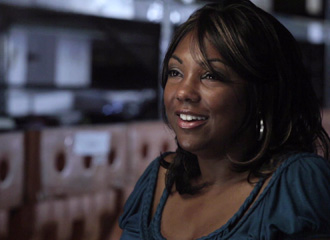"They Didn’t Understand Why We Were Never There"
3-minute read
"They Didn’t Understand Why We Were Never There"
3-minute read
Nicole was never afraid to deploy — to get on that plane, knowing that dangerous moments may lie ahead. But this feeling was something new.
When Nicole deployed to Korea, her youngest daughter was just 6 months old. When she returned a half year later, her daughter didn’t recognize her. “I understood,” Nicole says, “but it was gut-wrenching.”
April is the Month of the Military Child, and Nicole’s story — one of the first Veteran stories shared with Make the Connection — illustrates some of the challenges that military families can face. The missed moments. The sleepless nights. The effort to reconnect.
“I don’t know if I can even put it into words,” Nicole says of serving abroad, away from her children. “It’s just — there are things about them that I simply do not know. There are stories that they have that they can laugh about with my mom, that I just — I don’t have that firsthand knowledge of.”
Before one of Nicole’s deployments, her mother moved in with them to help out at home. Through it all, her mother was a “rock,” Nicole says. She was there for her grandchildren, giving them someone to turn to. But still, there were naturally some tougher times.
“I didn’t realize at the time some of the impacts that were happening with my children,” Nicole says. “And not understanding that they did worry, that they did have an imagination about what kinds of things could be happening to us while we were away.”
There were periods when her oldest daughter began to withdraw, or her son acted out. “What they tell me now is that they just felt like I was never there. And at that time, they didn’t understand why we were never there.”
Her daughter had night terrors, and both Nicole and her husband — who served as a combat engineer — struggled to sleep. “Our whole family is up in the middle of the night most of the time,” she says.
After an 18-month deployment, Nicole’s husband faced PTSD and survivor guilt. He was haunted by memories of the day his convoy came under attack. He chose to ride in a different vehicle that day, and the seat he usually occupied was “obliterated.”
Upon returning, he was quieter than usual and withdrew. Initially, Nicole says, her kids felt like they had lost their friend. “He used to do so much with them.”
The biggest challenge for me was just the new perspective that you have.Nicole
After she deployed, Nicole says, “the biggest challenge for me was just the new perspective that you have. Once you’ve gone once, subsequently you know that the same person is not going to come back. But the people you leave behind, they don't know that. They don't realize that. And they expect to be able to pick up right where you left off. And that's not the case.”
For Nicole, the time away — the things she saw — manifested themselves in obsessive-compulsive disorder (OCD). Serving as a medic, she had found that the best way to get her job done was to detach herself from her work, like treating a young lieutenant who stepped on a homemade mine.
“Just react,” she says. “And just be there, and just not think. Just go straight to step one, step two, step three, step four. And then you think about it afterwards.”
When Nicole returned home, she found herself needing to do everything the same way, every time. She wouldn’t turn left in her car without a traffic light. At the grocery store, she had to pack groceries onto the conveyor belt a certain way. Even for housework, like cleaning and washing the dishes, there were specific ways she had to do it all.
“Drove my family nuts,” she says.
Nicole eventually found support through VA. Medication relieved the OCD symptoms, and counseling helped the family begin to repair and reinforce its bonds.
“I think the biggest thing for me was not listening,” she says. “When I actually sat down and started listening to the people who loved me tell me, ‘You know, this is what you’re doing. This is how this is coming out. This is what I think.’ I was like, OK. When you listen to those voices that you’re affecting, that you love, then you don’t have any choice but to at least go find out: Is there a problem that can be rectified?”
Another lesson that she’s taken with her: You don’t have to face these challenges alone.
“Isolation … breeds fear. It breeds sadness,” Nicole says. “But if you take the opportunity to surround yourself with love, with understanding, with the people who really care about you or people who relate to what is it that you are feeling, then only good can come from that.
“No one can do this alone. We went where we went as a team, as a platoon, as a squad, and we did it together. So the only way to overcome what we did together is to continue to work together to do that.”

